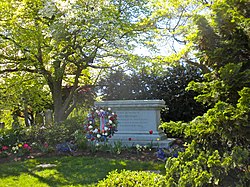History
On October 3, 1849, leaders of the Trinity Lutheran Church in Lancaster formally decided to begin the process to create a new cemetery for Lancaster County, Pennsylvania. A committee appointed by church leaders on November 10, 1849 subsequently reported back to church leaders that it had purchased "twelve acres, one quarter, and thirty perches" of land from Em. C. Reigert, esquire, and a board of trustees was elected by members of the church on November 4, 1850. [4]
Woodward Hill Cemetery was then officially incorporated by the Pennsylvania State Senate in April 1851, following several months of debate by the Senate and the Pennsylvania House of Representatives. [5] [6] [7] [8]
Following requests by members of the public that the cemetery be a non-denominational burial ground, preparations were made to transfer the cemetery's ownership to a group of stockholders, which led the cemetery to being officially declared a non-sectarian facility on February 2, 1852. [9]
The cemetery became more widely known nationwide just over fifteen years later when James Buchanan, the fifteenth president of the United States was buried here on June 4, 1868, [10] following his death three days earlier at Wheatland, his Lancaster County home, from respiratory failure. He was seventy-seven years old at the time of his death. [11] Reporters for local newspapers noted that Buchanan's casket was "followed to the grave by the largest cortege that ever attended the funeral obsequies of any President who died out of office." Lancaster's Intelligencer Journal added: [12]
"The magnificent and imposing funeral parade of yesterday was a spontaneous tribute of respect from the masses. Without distinction of party, the people of Lancaster city and county turned out to pay a last and fitting tribute of respect to their most distinguished fellow-citizen. All party animosities were forgotten, and with a generous spirit that was most honorable, those who had been Mr. Buchanan's bitterest political opponents vied with his personal friends in doing honor to the illustrious dead. A delegation from the Congress of the United States; the Mayor, City Council, Judges, Aldermen, and other official officers of New York city, with a delegation from the City Councils of Baltimore, were present in line of the procession. Large delegations from Philadelphia, Harrisburg and York, comprising many of the most prominent citizens took part in the imposing parade....
"The scene at the burial place was not the least imposing of this interesting day. The paths of Woodward Cemetery were lined with ladies and children from noon till the sound of the funeral trumpets were heard descending the slop of the Marietta turnpike.... When the large procession arrived, to the thud of muffled drums and the long plaintive peal of the trumpets, those persons who constituted the advance body—firemen, beneficial associations, etc., formed in line on either side of the turnpike while the Masons, lawyers and the numerous carriages and strange guests filed through them. It was a scene of solemn and yet imposing interest, the music stirring the foliage and silencing the birds among the trees, sounded strong, soft, dirge-like by turns; and to its heavy pulses the feet of the people fell, until at last the hearse moving among them all brought the President of the United States to his last palace, where he shall be laid away to the fame to which the sober memory and verdict of men will consign him."
This page is based on this
Wikipedia article Text is available under the
CC BY-SA 4.0 license; additional terms may apply.
Images, videos and audio are available under their respective licenses.



